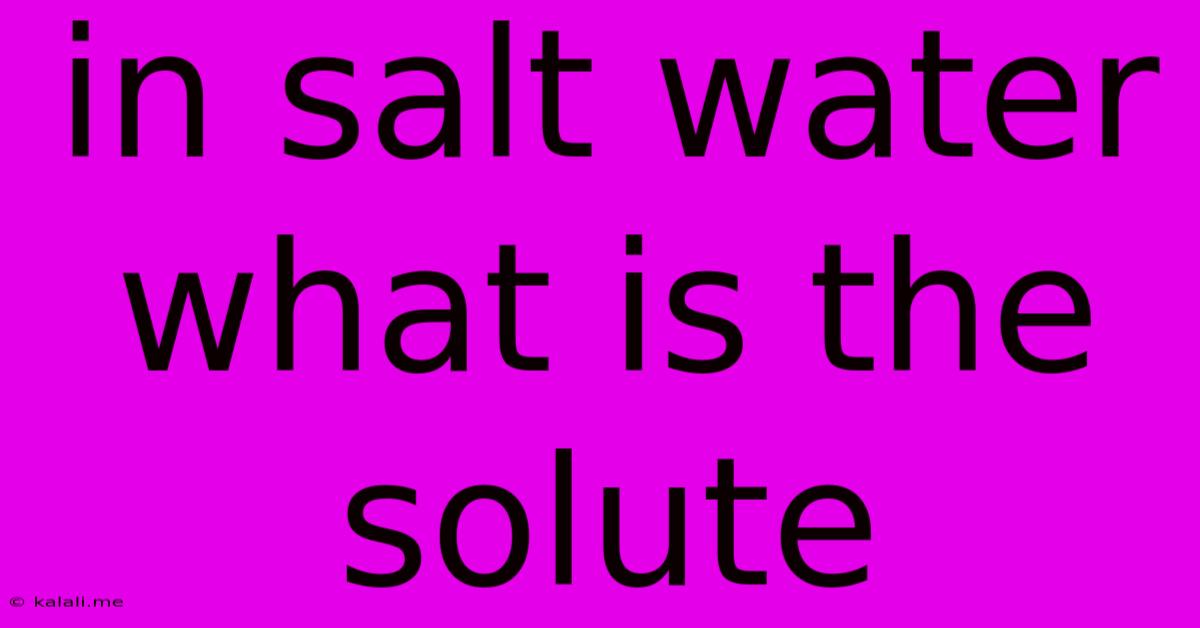In Salt Water What Is The Solute
Kalali
May 09, 2025 · 3 min read

Table of Contents
In Salt Water: What is the Solute? Understanding Solutions and Their Components
Salt water, a ubiquitous substance found in oceans and seas across the globe, is a classic example of a solution. Understanding the components of this solution is key to grasping fundamental chemistry concepts. This article will clearly explain what the solute is in salt water, along with related concepts like solvent and solution.
What is a Solution?
Before we dive into the specifics of saltwater, let's define what a solution is. A solution is a homogeneous mixture of two or more substances. This means the components are uniformly distributed throughout the mixture, resulting in a consistent composition throughout. Solutions are characterized by two key components:
- Solute: The substance that is dissolved in the solvent. It's typically present in a smaller amount than the solvent.
- Solvent: The substance that dissolves the solute. It's typically present in a larger amount than the solute.
The resulting combination of solute and solvent is the solution.
Identifying the Solute and Solvent in Salt Water
Now, let's apply this to salt water. Salt water is a solution where:
-
The solute is salt (NaCl), or more precisely, sodium chloride. When salt is added to water, the ionic bonds in the salt crystal break down, and the sodium (Na+) and chloride (Cl-) ions become surrounded by water molecules. This process is called dissolution.
-
The solvent is water (H₂O). Water's polar nature, with its slightly positive and negative ends, allows it to effectively interact with and dissolve the charged ions of salt. This is why water is such a good solvent for many ionic compounds.
Therefore, in salt water, the solute is salt (NaCl). The salt dissolves into the water, forming a homogenous solution.
Beyond Salt: Other Solutes in Seawater
While salt is the predominant solute in seawater, it's crucial to remember that seawater isn't just salt and water. It's a complex solution containing numerous other dissolved substances, including:
- Other salts: Magnesium chloride, potassium chloride, and calcium sulfate are just a few examples. These contribute to the overall salinity of the seawater.
- Dissolved gases: Oxygen, nitrogen, and carbon dioxide are dissolved in seawater, vital for marine life.
- Organic matter: This includes dissolved organic carbon from decaying plants and animals.
- Minerals: Various trace minerals contribute to the overall chemical composition of seawater.
These additional solutes, while present in smaller quantities than salt, contribute significantly to the overall properties and ecological balance of the marine environment.
Understanding Solution Concentration
The amount of solute dissolved in a given amount of solvent is known as the concentration of the solution. In seawater, the concentration of salt (and other solutes) can vary depending on location and factors like evaporation and freshwater inflow. This variation in salinity influences the density and properties of seawater.
In conclusion, while the dominant solute in saltwater is undeniably sodium chloride (salt), it's important to remember the complex nature of seawater as a solution containing numerous other dissolved substances. Understanding these components is essential for appreciating the chemistry and ecology of our oceans.
Latest Posts
Latest Posts
-
How Far Is Cummings Ga From Atlanta
Jul 04, 2025
-
How Many Nickels Are In Two Dollars
Jul 04, 2025
-
What Is 1 3 Of A Mile
Jul 04, 2025
-
How Do You Say The Bread In Spanish
Jul 04, 2025
-
How Long Does It Take To Walk 2 5 Miles
Jul 04, 2025
Related Post
Thank you for visiting our website which covers about In Salt Water What Is The Solute . We hope the information provided has been useful to you. Feel free to contact us if you have any questions or need further assistance. See you next time and don't miss to bookmark.